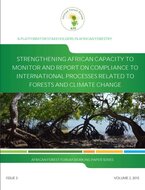The African continent remains the most vulnerable region in the world to the impact of climate change, mainly due to weak resilience and adaptive capacity. There is limited knowledge on the relationship between forests and climate change in Africa; and especially on adaptation and mitigation to the adverse effects of climate change, as well as capitalizing on the opportunities that climate change and variability offer the continent. Understanding, strengthening and further developing the relationship between forest and climate is therefore key issue to Africas future development. This is because of the key roles forests and trees outside forests play in the lives of people and animals on the continent, as well as on the economies of African countries and the environment in which the people, livestock and wildlife live in. However, the nature of this relationship and its impact is greatly influenced by how international forest and climate change and related agreements are incorporated into national policies and practices.
With respect to the Africa, it is important to understand how individual African countries are implementing ideas and recommendations that come from international conventions, agreements, protocols, and other initiatives (all of them are in this text referred to as international agreements) that have a bearing on how climate change and variation could affect forests and vice versa. This could facilitate positioning the forest sector better to contain the adverse effects of climate change as well as take advantage of opportunities that come with the same. It would also make it easier to profile Africa and its sub-regions both at regional and international levels. This could lead to enhanced collaboration and support from institutions and other players that support the implementation of these international agreements, and especially during this era when forests are increasingly seen as contributing not only to international public goods but to international services like carbon sequestration that has global implications.
The study whose results are reported in this document was commissioned by the African Forest Forum with the several objectives, namely: to assess how individual African countries are implementing the forest, climate change and related international conventions; how these international conventions are adding value to their national forestry sector policies and programmes; and to develop an approach on how Africa can to monitor and report on compliance to international processes related to forests and climate. The study was conducted in eight African countries, namely: Cameroon, Rwanda, Gabon, Nigeria, Zambia, Zimbabwe and Niger and Tanzania.

